- Home
- Jr. Horatio Alger
The Young Musician; Or, Fighting His Way Page 3
The Young Musician; Or, Fighting His Way Read online
Page 3
"No, Frank, not quite; but it's almost over..Who do you think bid onfather's gold watch?"
"I don't know."
"Nick Holden."
"He didn't get it, did he?"
"I am glad to say not. Your father bought it."
"Did he! Why, he's got one watch already."
"I am glad he's got it. I couldn't bear to think of Nick Holden carryingmy father's watch. He was disappointed about one thing besides."
"What was that?"
"The violin. He went to Squire Pope, and complained that it was not inthe sale."
"That's just like his impudence. What did the squire say?"
"He came to me and ordered me to get it, so that it might be sold."
"Shall I get it for you, then?"
"Not much!" answered Philip emphatically. "It is mine, as I havealready told you. If the auction doesn't bring in enough to settle upeverything, I may agree to sell it for a fair price; but I am sure, fromthe prices, that it won't be necessary."
"Squire Pope's a dreadful obstinate man," said Frank doubtfully. "He mayinsist upon your selling the violin."
"Let him do it!" said Philip contemptuously. "I should like to see himget it. Where have you put it, Frank?"
"Where Squire Pope won't be apt to find it--in an old chest up in thegarret. It's full of old clothes, belonging to my grandfather, andhasn't been looked into by any one except me for years. I put it awayunder all the clothes at the bottom. No one knows where it is except youand me, not even mother."
"That's good. I guess we can defy the squire, then."
Half an hour later, Mr. Dunbar came home from the auction.
Philip went to meet him.
"Thank you for buying father's watch," he said. "But for you, NickHolden would have had it, and I should have been sorry for it."
"He was badly disappointed," said Mr. Dunbar smiling. "But I didn't buythe watch for myself, Philip."
"For whom, then?" asked Philip, in some surprise.
"For the one that has the best right to it--for you," and the farmertook the watch from his pocket, and handed it to Philip.
"But I haven't the money to pay for it, Mr. Dunbar," said our hero.
"Then I give it to you as a present," said Mr. Dunbar.
"I am very grateful," said Philip; "but I ought not to accept it. Youare too kind to me."
"Let me be the judge of that."
"Besides, it wouldn't be safe for me to take it. Squire Pope will try toget my violin away from me in order to sell it, and he would be sure totry to do the same by the watch if he found that I had it."
"But, Philip, I don't need the watch myself."
"Then, Mr. Dunbar, will you be kind enough to keep it for me, and when Ican afford to pay for it, and there is no danger of its being takenfrom me, I will ask you for it. I shall be very glad, indeed, when I amolder, to carry my father's watch, for I have seen it in his hands sooften that it will constantly remind me of him."
"Perhaps that will be the best arrangement," said Mr. Dunbar. "You mighthave it stolen from you, if you carried it yourself just at present. Asyou request, I will keep it, subject to your order; but I would ratherlet it be a gift from me, and not require you to pay for it."
"We won't talk about that now," said Philip, smiling. "At any rate, youmust let me thank you for your great kindness to me."
"Don't speak of that, Phil," said the farmer kindly. "I had a greatrespect and liking for your father, and I verily believe my Frank lovesyou as well as if you were his own brother. So, come what may, you havea friend in our family."
"I indorse all that father says," Frank said.
And he extended his hand to Philip, who grasped it heartily.
It warmed his heart to think that he had such good friends, though hewas an orphan and alone in the world.
After supper, Mr. Dunbar went to the village store, while Frank andPhilip remained at home.
Suddenly Frank said:
"Philip, you are going to have a visitor, I guess."
"A visitor!"
"Yes; I saw Squire Pope stumping along the road, nourishing hisgold-headed cane. He is headed this way, and it's likely he is going tohonor you with a call. He's got somebody with him, too. Who is it!"
Philip shaded his eyes with his hand, for the Sun was near its setting,and shining with dazzling brightness from the quarter toward which hewas looking.
"It's Nick Holden!" he said.
"So it is! What can he want?"
"I understand very well. He wants my violin. He couldn't get it at thesale, so he has come here to see if he can't make me give it to him."
"And will you?"
"You ought to know me better than to ask, Frank," said Philip firmly."Nick might as well have stayed away, for he won't accomplish anything."
Nick, however, held a different opinion. After Philip left the cottage,he had gone to Squire Pope, and cunningly asked:
"Are you going to let Philip keep his fiddle in spite of you, squire?"
"What do you mean, Nicholas?" demanded the squire, in a stately way.
"Why, seems to me he's kinder settin' up his will agin yours. You saythe fiddle shall be sold, and he says it shan't. He told me he didn'tcare what you said, he should keep it."
"Did he say that, Nicholas?" asked the squire, who felt that his dignitywas outraged by such insolence.
"I'm sartain he did. He's pretty big feelin', Phil is. He always wantsto have his own way."
"He will find that he can't defy me with impunity," said the squirestiffly.
"Just so. Then you'll sell me the fiddle?"
"I will!" said the squire emphatically.
"You won't ask too much, will you?" asked Nick anxiously.
Now Squire Pope, who knew nothing of the price of violins, and had avery inadequate idea of their value, after some haggling on the part ofNick, agreed to sell him the instrument for two dollars and a half, andto see that it was delivered that evening.
"Do you know where it is, Nicholas?" he asked.
"Why, Phil is staying over at Frank Dunbar's, and I guess he's got itthere somewhere. I guess we'd better go over there and get it."
"Very well, Nicholas. After supper, if you will come to my house, I willgo over there, and see that you have the instrument."
"All right, squire!" said Nick gleefully, "Phil will find that he can'thave his own way this time."
"I apprehend he will," said the squire complacently.
Now the reader understands how it happened that Squire Pope and NickHolden made a call on Philip. As to what passed at the interview, wemust refer him to the next chapter.
CHAPTER VI. FUSS ABOUT A FIDDLE.
"Ahem! Good evening!" said Squire Pope to Frank Dunbar, taking no noticeof Philip's cold but polite salutation.
"Good evening! Will you go into the house?" said Frank.
"I believe not. I have not time."
"I am sorry father isn't home. He just started for the village."
"Ahem! it was not to see your father that I called," answered SquirePope. "I wish to have a few words with this young man," indicatingPhilip stiffly.
"I am at your service, Squire Pope," said Philip, with ceremoniouspoliteness.
"We came about the fiddle," interrupted Nick Holden, who always wantedto have a share in the conversation.
Squire Pope frowned, for he did not relish Nick's interference.
"Nicholas," he said severely, "I apprehend I am competent to manage thebusiness we have come upon."
"Don't get riled, squire," said Nick, by no means abashed by thisrebuke. "I thought you were kinder slow about comin' to the point."
"Your interruption was very indecorous. I do not require any assistanceor any suggestions."
"All right, squire!"
Squire Pope now turned to our hero, and said:
"As I was about to say, when interrupted by Nicholas, I have come torequire you to give up--the Violin which, without authority and againstmy express command, you withhe
ld from the auction."
"The violin is mine, Squire Pope," said Philip firmly, "and I mean tokeep it!"
"You talk like an ignorant boy. As a minor, you had no claim to thepossession of any article except your clothing. I judged it best thatthe violin should be sold at the auction, and it is presumptuous for youto set up your judgment against mine!"
"I don't take that view of it," said Philip, and then he stopped.
He knew it was of no use to argue against the squire, who was obstinateto the verge of pig-headedness, if I may be allowed to use theexpression. He felt that it would be only wasting his breath.
"It is quite immaterial how you view the subject," said the squirepompously. "My mind is made up, and my resolution is not likely to beshaken by a boy."
"Then, sir," answered Philip, in a respectful tone but with a slightsmile, "it is hardly worth while for me to say any more."
"I am glad you have arrived at so sensible a conclusion," said SquirePope. "I take it that you have the violin here."
"Yes, sir."
"Then bring it out and give it to me."
Now came the critical point, when Philip must array himself indetermined opposition to Squire Pope. He felt that he was entirely inthe right; still he regretted the necessity of the antagonism.
Philip had one thing in his favor: He had plenty of self-control, and,although he was very indignant at the course of the squire, which heregarded as unjustifiable, he made up his mind to be as respectful ascircumstances would permit.
"I don't think you understand me, Squire Pope," he said. "I refuse togive up the violin!"
"You refuse to give up the violin!" repeated Squire Pope, scarcelybelieving the testimony of his ears. "Do I hear you aright?"
"Yes, sir."
"I never see such impudence!" ejaculated Nick Holden, wishing to egg onthe squire.
"Do you mean to defy me to my face?" demoded Squire Pope, growing veryred.
"I don't wish to defy you or anybody else," returned Philip; "but Ishall stand up for my rights."
"Misguided boy!" said the squire severely; "you will yet rue this rashand heedless course. Frank," he continued, turning to Frank Dunbar, "doyou know where Philip's violin is!"
"Yes, sir."
"Do me the favor to bring it out and place it in my hands."
"You must excuse me, Squire Pope," answered Frank. "It belongs toPhilip, and I have no right to meddle with it."
"If Philip has told you this, he has misrepresented," said the squire,rather discouraged by this second rebuff. "The violin does not belong toPhilip. It belongs to this young man."
And, with a wave of his hand, he designated Nick Holden.
It was not polite, but Frank Dunbar was so surprised by thisannouncement that he whistled.
As for Philip, he regarded Nick calmly; but there didn't seem to be anysign of yielding in his look.
"It belongs to Nicholas, because I have sold it to him," continuedSquire Pope doggedly.
"That's so!" corroborated Nick complacently. "The squire sold me thefiddle for two-fifty. It's mine now, and you'd better fetch it alongout, or there'll be trouble."
Philip turned to Squire Pope, and said quietly:
"As you had no right to sell it, the sale amounts to nothing. If youhad a right, I should say you were not very shrewd to sell an instrumentthat cost twenty-five dollars--and was considered a bargain at theprice--for two dollars and fifty cents."
"The violin cost twenty-five dollars!" ejaculated the squire, in genuinesurprise.
For, as it has already been stated, he had no idea whatever of the usualprice for a violin.
"Yes, sir."
"Don't you believe him, squire," said Nicholas, afraid that he wouldlose what he knew to be a good bargain. "No fiddle that was ever madecost twenty-five dollars. It's ridiculous!"
"It does seem a large price," said the squire guardedly.
Squire Pope would doubtless have been surprised to learn that certainviolins of celebrated make--such as the Cremonas--have sold forthousands of dollars. Probably he would have disbelieved it.
Nevertheless, he began to think that he had been too precipitate inaccepting Nick Holden's offer.
If he should sacrifice, or sell at an utterly inadequate price, anyarticle belonging to the boy whom he considered his ward, he knew thathe would be blamed, and he began to consider how he could recede fromthe bargain.
"Nicholas," he said, "I didn't exactly sell the violin to you. I willascertain what is a fair price for it, and then I will consider yourproposal."
"You sold it right out, squire," said Nick, "and I can prove it. Didn'tyou just say it was mine. There, now!"
Nick turned triumphantly to Frank and Phil, but, for very good reasons,they did not care to side with him.
"I say, you haven't treated me right," persisted Nick, who had noparticular respect nor veneration for the squire, and was not to bedeterred from speaking as he felt. "I offered you two-fifty, and yousaid I should have it, and you got me to call at your house to come herefor it."
"I cannot sacrifice the property of my ward," said Squire Pope. "I mustascertain how much the violin is worth."
"A bargain is a bargain, every time!" said Nick, irritated.
"I will let you have it as cheap as anybody," said the squire, whothought it possible that Nick might be the only one who desired topurchase it. "That ought to satisfy you. Philip, go and bring methe violin, and I will carry it home and dispose of it to the bestadvantage."
"You must excuse me, Squire Pope. I shall not let it leave mypossession." Just then Squire Pope espied Mr. Dunbar returning from thevillage, and hailed him as a probable ally. He laid the matter beforehim, and requested him to compel Philip to get the violin.
"You must excuse me, squire," said Mr. Dunbar coldly. "Philip is myguest, and he shall be protected in his rights as long as he remainshere."
Without a word, Squire Pope walked off, in angry discomfiture, in onedirection, while Nick, equally dissatisfied, walked off in another.
"They don't seem happy!" said Frank slyly.
"I wish I knew where it was going to end," returned Philip gravely.
"It seems to me," said Frank, "the squire is making a great fuss about afiddle, for a man of his dignity."
"He doesn't care about the violin. He wants to have his own way," saidPhilip, thus hitting the nail on the head.
CHAPTER VII. MR. JOE TUCKER
Before going further, I will introduce to the reader, a citizen ofNorton, who filled a position for which he was utterly unfitted. Thisman was Joe Tucker, in charge of the almshouse.
He had not been selected by the town authorities on the ground offitness, but simply because he was willing to work cheap. He received acertain low weekly sum for each one of his inmates, and the free use ofapartments for himself and family, with the right to cultivate the tenacres of land connected with the establishment, and known as the TownFarm.
His family consisted of three persons--himself, his wife, and a son,Ezekiel, familiarly known as Zeke, now sixteen years old. The leadingfamily trait was meanness.
Mr. Tucker supplied a mean table even for a poorhouse, and some of thehapless inmates complained bitterly. One had even had the boldness topresent a complaint to the selectmen, and that body, rather reluctantly,undertook to investigate the justness of the complaint. They deputedSquire Pope to visit the poorhouse and inquire into the matter.
Now, though Squire Pope thought himself unusually sharp, it was theeasiest thing in the world for a cunning person like Joe Tucker tosatisfy him that all was right.
"Mr. Tucker," said Squire Pope pompously, "I am deputed by theselectmen, and I may add by the overseers of the poor, to investigate acomplaint made by one of the paupers in relation to the fare you offerthem."
"Who is it!" inquired Mr. Tucker.
"It is Ann Carter. She says you don't allow her sugar in her tea, andonly allow one slice of bread at supper, and that the meat is so bad shecan't eat it."
; "Just like the old woman!" exclaimed Mr. Tucker indignantly. "Oh, she'sa high-strung pauper, she is! Expects all the delicacies of the seasonfor seventy-five cents a week. She'd ought to go to the Fifth AvenooHotel in New York, and then I'll bet a cent she wouldn't be satisfied."
It is observable that even in his imaginary bets Mr. Tucker maintainedhis economical habits, and seldom bet more than a cent. Once, when verymuch excited, he had bet five cents, but this must be attributed to hisexcited state of mind.
"So you regard her complaints as unreasonable, do you, Mr. Tucker?"observed the investigating committee.
"Unreasonable? I should think they was. I allow, Squire Pope, wedon't live like a first-class hotel"--Mr. Tucker's language was rathermixed--"but we live as well as we can afford to. As to sugar, we don'tallow the paupers to put it in for themselves, or they'd ruin us bytheir extravagance. Mrs. Tucker puts sugar in the teapot before shepours it out. I s'pose Ann Carter would put as much in one cup of tea asMrs. T. uses for the whole teapotful, if she had her way."
This was very probably true, as the frugal Mrs. Tucker only allowed oneteaspoonful for the entire supply.
"That looks reasonable, Mr. Tucker," said the squire approvingly. "Nowabout the bread and the meat?"
"The paupers has plenty of bread," said Mr. Tucker. "Our bread bill isactually enormous."
"And as to the meat?"
"We don't give 'em roast turkey every day, and we don't buy tenderloinsteaks to pamper their appetites," said Mr. Tucker, "though we'reperfectly willing to do it if the town'll pay us so we can afford it. Doyou think the town'll agree to pay me twenty-five cents more a week foreach one, squire?"

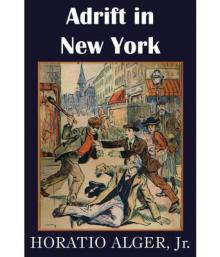 Adrift in New York: Tom and Florence Braving the World
Adrift in New York: Tom and Florence Braving the World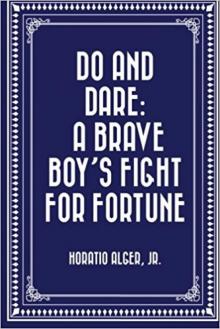 Do and Dare — a Brave Boy's Fight for Fortune
Do and Dare — a Brave Boy's Fight for Fortune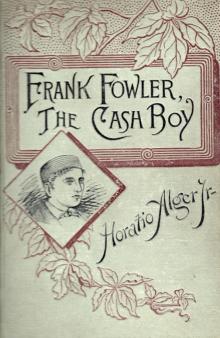 The Cash Boy
The Cash Boy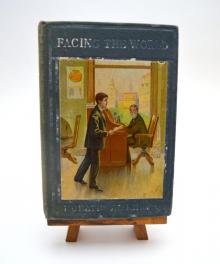 Facing the World
Facing the World The Young Explorer; Or, Claiming His Fortune
The Young Explorer; Or, Claiming His Fortune The Store Boy
The Store Boy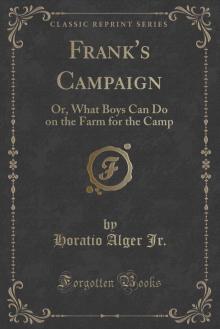 Frank's Campaign; Or, The Farm and the Camp
Frank's Campaign; Or, The Farm and the Camp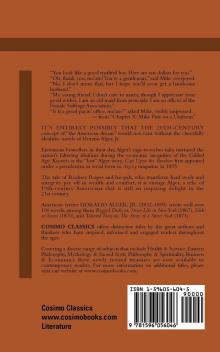 Cast Upon the Breakers
Cast Upon the Breakers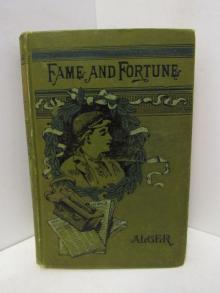 Fame and Fortune; or, The Progress of Richard Hunter
Fame and Fortune; or, The Progress of Richard Hunter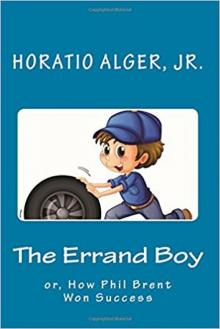 The Errand Boy; Or, How Phil Brent Won Success
The Errand Boy; Or, How Phil Brent Won Success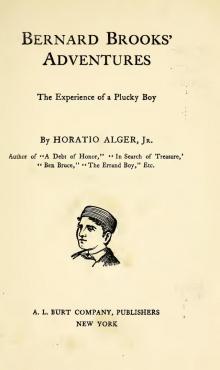 Bernard Brooks' Adventures: The Experience of a Plucky Boy
Bernard Brooks' Adventures: The Experience of a Plucky Boy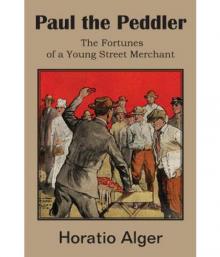 Paul the Peddler; Or, The Fortunes of a Young Street Merchant
Paul the Peddler; Or, The Fortunes of a Young Street Merchant Brave and Bold; Or, The Fortunes of Robert Rushton
Brave and Bold; Or, The Fortunes of Robert Rushton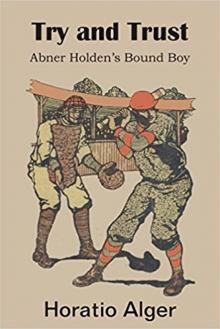 Try and Trust; Or, Abner Holden's Bound Boy
Try and Trust; Or, Abner Holden's Bound Boy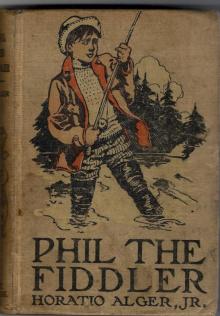 Phil, the Fiddler
Phil, the Fiddler In A New World; or, Among The Gold Fields Of Australia
In A New World; or, Among The Gold Fields Of Australia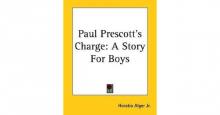 Paul Prescott's Charge
Paul Prescott's Charge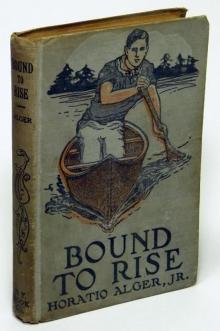 Joe's Luck; Or, Always Wide Awake
Joe's Luck; Or, Always Wide Awake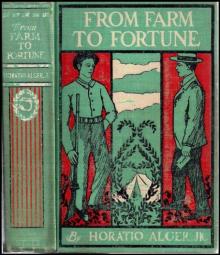 From Farm to Fortune; or, Nat Nason's Strange Experience
From Farm to Fortune; or, Nat Nason's Strange Experience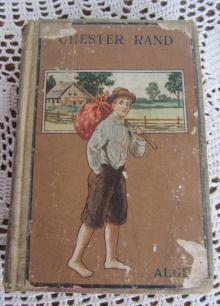 Chester Rand; or, The New Path to Fortune
Chester Rand; or, The New Path to Fortune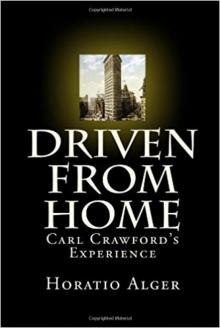 Driven from Home; Or, Carl Crawford's Experience
Driven from Home; Or, Carl Crawford's Experience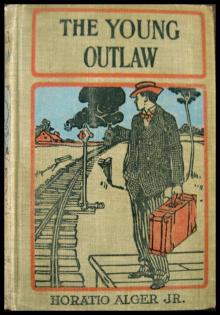 The Young Outlaw; or, Adrift in the Streets
The Young Outlaw; or, Adrift in the Streets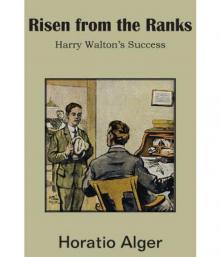 Risen from the Ranks; Or, Harry Walton's Success
Risen from the Ranks; Or, Harry Walton's Success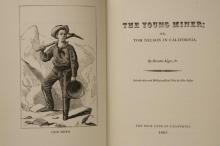 The Young Miner; Or, Tom Nelson in California
The Young Miner; Or, Tom Nelson in California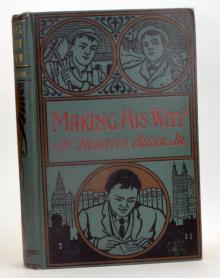 Making His Way; Or, Frank Courtney's Struggle Upward
Making His Way; Or, Frank Courtney's Struggle Upward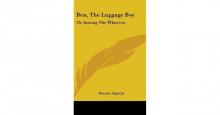 Ben, the Luggage Boy; Or, Among the Wharves
Ben, the Luggage Boy; Or, Among the Wharves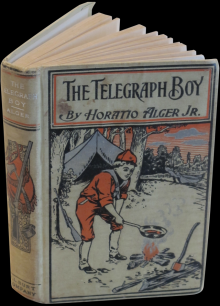 The Telegraph Boy
The Telegraph Boy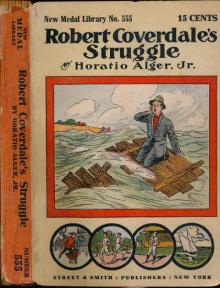 Robert Coverdale's Struggle; Or, on the Wave of Success
Robert Coverdale's Struggle; Or, on the Wave of Success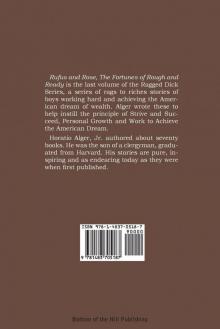 Rufus and Rose; Or, The Fortunes of Rough and Ready
Rufus and Rose; Or, The Fortunes of Rough and Ready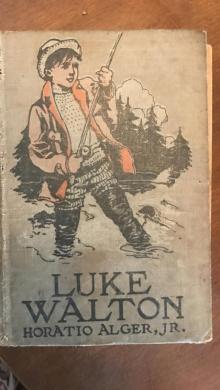 Luke Walton
Luke Walton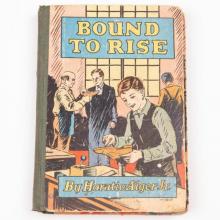 Mark Mason's Victory: The Trials and Triumphs of a Telegraph Boy
Mark Mason's Victory: The Trials and Triumphs of a Telegraph Boy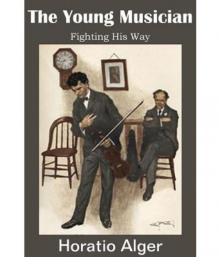 The Young Musician; Or, Fighting His Way
The Young Musician; Or, Fighting His Way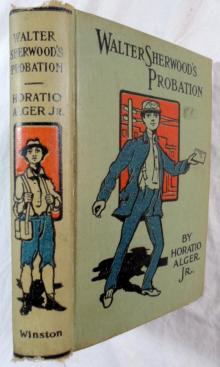 Walter Sherwood's Probation
Walter Sherwood's Probation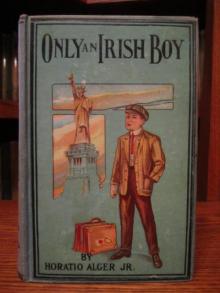 Only an Irish Boy; Or, Andy Burke's Fortunes
Only an Irish Boy; Or, Andy Burke's Fortunes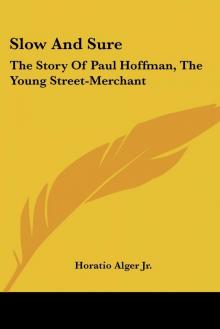 Slow and Sure: The Story of Paul Hoffman the Young Street-Merchant
Slow and Sure: The Story of Paul Hoffman the Young Street-Merchant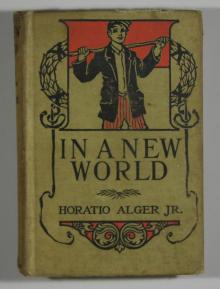 Herbert Carter's Legacy; Or, the Inventor's Son
Herbert Carter's Legacy; Or, the Inventor's Son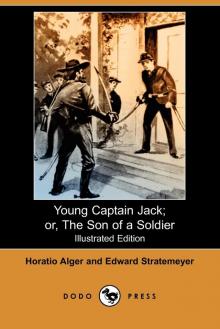 Young Captain Jack; Or, The Son of a Soldier
Young Captain Jack; Or, The Son of a Soldier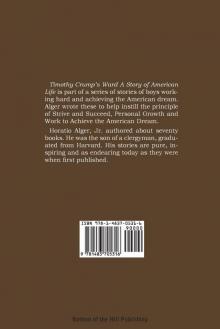 Timothy Crump's Ward: A Story of American Life
Timothy Crump's Ward: A Story of American Life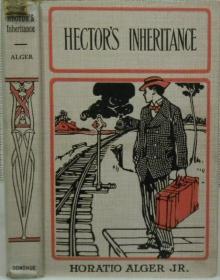 Hector's Inheritance, Or, the Boys of Smith Institute
Hector's Inheritance, Or, the Boys of Smith Institute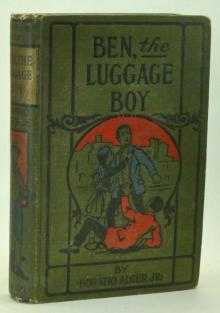 Ben's Nugget; Or, A Boy's Search For Fortune
Ben's Nugget; Or, A Boy's Search For Fortune